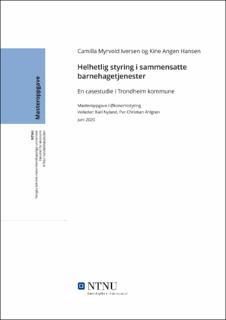| dc.contributor.advisor | Nyland, Kari | |
| dc.contributor.advisor | Ahlgren, Per Christian | |
| dc.contributor.author | Iversen, Camilla Myrvold | |
| dc.contributor.author | Hansen, Kine Angen | |
| dc.date.accessioned | 2021-09-14T17:16:46Z | |
| dc.date.available | 2021-09-14T17:16:46Z | |
| dc.date.issued | 2020 | |
| dc.identifier | no.ntnu:inspera:55685018:61328724 | |
| dc.identifier.uri | https://hdl.handle.net/11250/2777198 | |
| dc.description.abstract | I tråd med utviklingen av barnehagesektoren, med økt fremvekst av private barnehager, er det i dag omdiskutert hvorvidt nåværende regulering gir kommuner gode forutsetninger for å gjennomføre en helhetlig oppvekst- og utdanningspolitikk. Det gir behov for å studere styring i en kontekst der styringen utøves i praksis. For å kartlegge styringen av kommunale og private barnehager i en kommune har vi formulert følgende problemstilling:
Hva karakteriserer Trondheim kommune sin styring av kommunale og private barnehager, og hva oppleves som de største styringsutfordringene?
For å besvare problemstillingen har vi gjennomført en kvalitativ casestudie. Datamaterialet er basert på åtte dybdeintervjuer med ulike aktører i barnehagesektoren i Trondheim kommune. Funn fra empiri, sammen med teori om organisering og styring, ble benyttet til analyse og diskusjon for å komme frem til et svar på vår problemstilling.
Våre hovedfunn tyder på at styringen av kommunale og private barnehager i en kommune består av en kombinasjon av tre former for styring: administrativ styring, sosial styring og selvstyring. Vi har kartlagt flere sentrale administrative styringsmekanismer, deriblant statlige retningslinjer og strategi. Kommunen benytter profesjon- og normstyring for å støtte opp under den administrative styringen. Vi har også kartlagt at kommunen legger til rette for at det oppstår sosial styring gjennom ulike former for tillit. På den måten har kommunen en bredt sammensatt styringspakke for å oppnå helhetlig styring.
Den todelte organiseringen av sektoren gjør imidlertid styringen kompleks. Vi diskuterer hvordan styringspakken er ulik overfor kommunale og private barnehager med bakgrunn i kommunens begrensede styringsmulighet over private barnehager. Våre funn antyder at styringspakken ikke løser alle kommunens utfordringer i styring av private barnehager. Det tyder på at samarbeidsproblemer, koordineringsproblemer og appropriasjonsproblemer er av betydning for relasjonen mellom kommunen og private barnehager. | |
| dc.description.abstract | In line with the growth of the pre-school sector, with specific focus on the private division, it is debated whether the current regulations provide the municipalities with substantial support to implement comprehensive advancement strategies and education policies. In order to map the management of the public and private pre-schools, the main question of this thesis is:
What characterizes Trondheim municipality's management of public and private pre-schools, and what are experienced as the greatest management control problems?
In order to answer the main question a qualitative study has been conducted. The data is based on eight interviews with various actors in the pre-school sector in Trondheim. The findings were incorporated with the theory of organizational and management controls and assisted us in addressing the main issue in question.
In conclusion, the information collected suggests that the management control of the pre-school sector in a municipality consists of a combination of three forms of control: administrative control, social control and self-control. Firstly, several administrative control mechanisms were addressed, including national laws, regulations and strategy plans. Further to the above, professional and clan control was used across the sector to support the administrative control. Secondly, the study finds that the municipality uses social control through various forms of trust. This way, the municipality can achieve corporate governance through a composed and more defined management control package.
However, the organization of the sector with two different organizational structures makes the management control complex. We discuss how the management package differs between public and private pre-schools based on the municipality's limited possibilities in the management control of private pre-schools. Our research indicates that the governance control package does not solve all the challenges faced by management in the private pre-school sector. A combination of cooperation problems, coordination problems and appropriation problems have an impact on the relationship between the municipality and private pre-school facilities. | |
| dc.language | | |
| dc.publisher | NTNU | |
| dc.title | Helhetlig styring i sammensatte barnehagetjenester - En casestudie i Trondheim kommune | |
| dc.type | Master thesis | |
